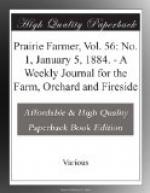DOCKING HORSES.
An English veterinary society has lately been discussing the question of docking the tails of horses. The President looked upon docking as an act of cruelty. By docking, the number of accidents from the horse holding the rein under the tail was greatly increased, for the horse has less power of free motion over the tail. If a short dock is put over the rein, the animal has so little control of the tail that he can not readily liberate the rein. The “stump” is sensitive, the same as the remaining part of an amputated finger. In the majority of cases he considered docking entirely unnecessary.
On the contrary, Doctor Axe (rather a suggestive name for an advocate of docking) thought the practice improved the looks of a horse, thus rendering it more salable. His sentimentality did not allow him to argue this question of increased value. He did not think docking increased accidents. Statistics, not assertions, were needed to establish facts of this kind. As to the remark of the President, that the shortened tail could not be so easily freed from the rein, he said it would depend on who was driving; an expert would more quickly disengage the rein from a docked tail. It may be true, he said, that there was more flexibility in an uncut tail because its more flexible portion had not been removed; but the docked tail had not the same power of covering and fixing down the rein that the long tail possessed. The long retention of a certain degree of sensibility after amputation was a known fact, but neither this, nor the operation itself, involved much pain. He detailed the structures divided, and said that they possessed a low degree of sensation. He would be glad to see horses have the free use of all their members, if practicable, and would leave them their tails if the removal of them could not increase the animal’s comfort, value, or power of being safely used, but he would not do anything to lessen the value of horses without good reason.
It seems that prosecutions for docking, under the cruelty to[***] common in England [***] convictions are not [***] in the discussion [***] vigorous prosecutions are [***]
We notice that with [***] and docking are on the increase [***] of this country. Fortunately [***] beasts, public sentiment in this [***] against the barbarous act; still [***] is it that fashion has not yet so [***] the taste of the majority of people [***] convince them that docking adds to [***] beauty of the noble animal. But the rage is now to imitate the English in nearly all manners and customs, and it may not be long before the miserable fashion will gain new headway with us.




